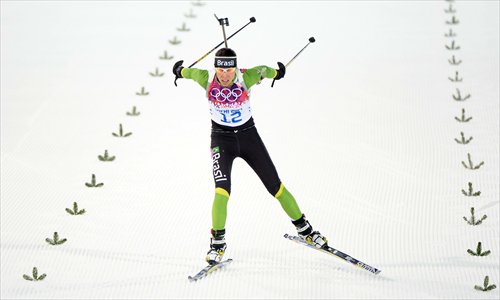HOME >> SPORTS
Brazil gives Sochi Games cool shoulder
Source:AFP Published: 2014-2-22 0:43:02

Jaqueline Mourao of Brazil competes in the women's 15 km Biathlon Individual during the Sochi Winter Olympic Games on February 14 in Sochi, Russia. Photo: CFP
Down on Copacabana Beach, there's plenty of talk about June's World Cup and political protest as Rio residents relax on the sand.
With their festival of soccer just four months away, the 2016 Olympic Games that Rio will welcome as the movement's first-ever South American host feel a long way off.
As for the ongoing Winter Olympic Games 11,000 km away in the Russian city of Sochi, for most beachgoers that event might as well be taking place on another planet.
But dig a little deeper and there is nascent interest in Brazil for winter sports - even curling.
Embarrassing Mourao
Brazil's Winter Sports Confederation boasted a 13-strong team this year in Sochi, a national record, but the country still awaits a first medal having started competing in 1992 at Albertville.
Biathlon athlete Jaqueline Mourao was the team flag bearer - but like most Brazilian winter athletes she trains far from home, in her case living in Quebec, Canada.
Mourao punched the air at finishing her events well down the field - and the media were not slow to mock.
"In 77th place, Brazil celebrates," trumpeted sports daily Lance to readers who had to wade through 30 pages of soccer coverage to discover Mourao had completed the 7.5 km biathlon.
"The important thing is I made it to the line - I didn't fall," said the 38-year-old defiantly.
She wore a smile again after doing better in the 15 km ... coming 76th.
Rio's "Carioca" residents are making valiant attempts to join the winter Olympic party.
In the western suburb of Barra de Tijuca, where much of the 2016 summer action will take place, broadcaster SporTV went so far as to set up a makeshift curling rink.
And children have flocked there.
Most crash to the ground within seconds but Sophia Duchemin twirls effortlessly around the ice.
"It's great fun. I really got into it watching the Vancouver Games in 2010.
"Watching the Sochi Games makes me want to strap on my skates," gushes the 10-year-old, whose father is French.
'Take me to a rink'
"We were on holiday about three years back in Portugal," explained mother Maria Claudia.
"Sophia said, 'Mom, please take me to a rink. I want to learn to skate.'
"Maybe she can do a Florent Amodio in reverse," laughed Maria Claudia, in reference to the Brazil-born skater adopted as a small child who became European champion for France in 2011.
Ice dancing clearly has appeal, says advertising graduate Luiz Alberto Benevides.
"I called my Mom and she said, 'call back later, I'm just watching the ice dancing,'" Benevides said.
Curling bemuses many, but fascinates Ana Prado, who co-writes a blog - Curling Brasil.
"Many Brazilians have been watching the Games, but the time zone doesn't help," Prado said, explaining she first heard about curling in 2010.
"We've got a Brazilian team, but they trained in Canada. In Brazil, curiosity for games and social media contribute to the growth of sport," she noted.
Globo newspaper reporter Helena Rebello said when curling emerged at the 1998 Nagano Games it "seemed like a weekend pursuit stuck in the middle of a professional program."
Yet media images of attractive 2014 Russian competitors have done the sport's pulling power no harm.
Bolivia-born Brazil resident Daniel Dalence took to Twitter to says he's hooked.
"Anyone got a video of the final end between Switzerland and Russia?" he asked after a thrilling encounter saw the Swiss just lose out.
Even Barcelona soccer star Neymar has kept tabs on some events and messaged injured freestyler Lais Souza after she missed out on Sochi.
"I'm praying you'll be back to cheer Brazil soon," the Barcelona star wrote.
Rio organizers will later dissect information brought back by 64 observers from Russia while seven were assigned to the Sochi organizing committee, focusing on issues including transport, information technology, doping control and Olympic village operations.
Brazil can get cold - the lowest temperature ever recorded was -14 C in southern Santa Catarina state in June 1952.
Rio residents reach for sweaters rather than skis once the thermometer dips to around the 15 C mark and most remain cool about icy pursuits.
"But you wait - Brazil is getting its skates on," grinned Duchemin before gliding effortlessly away.
Posted in: Feature, Olympics